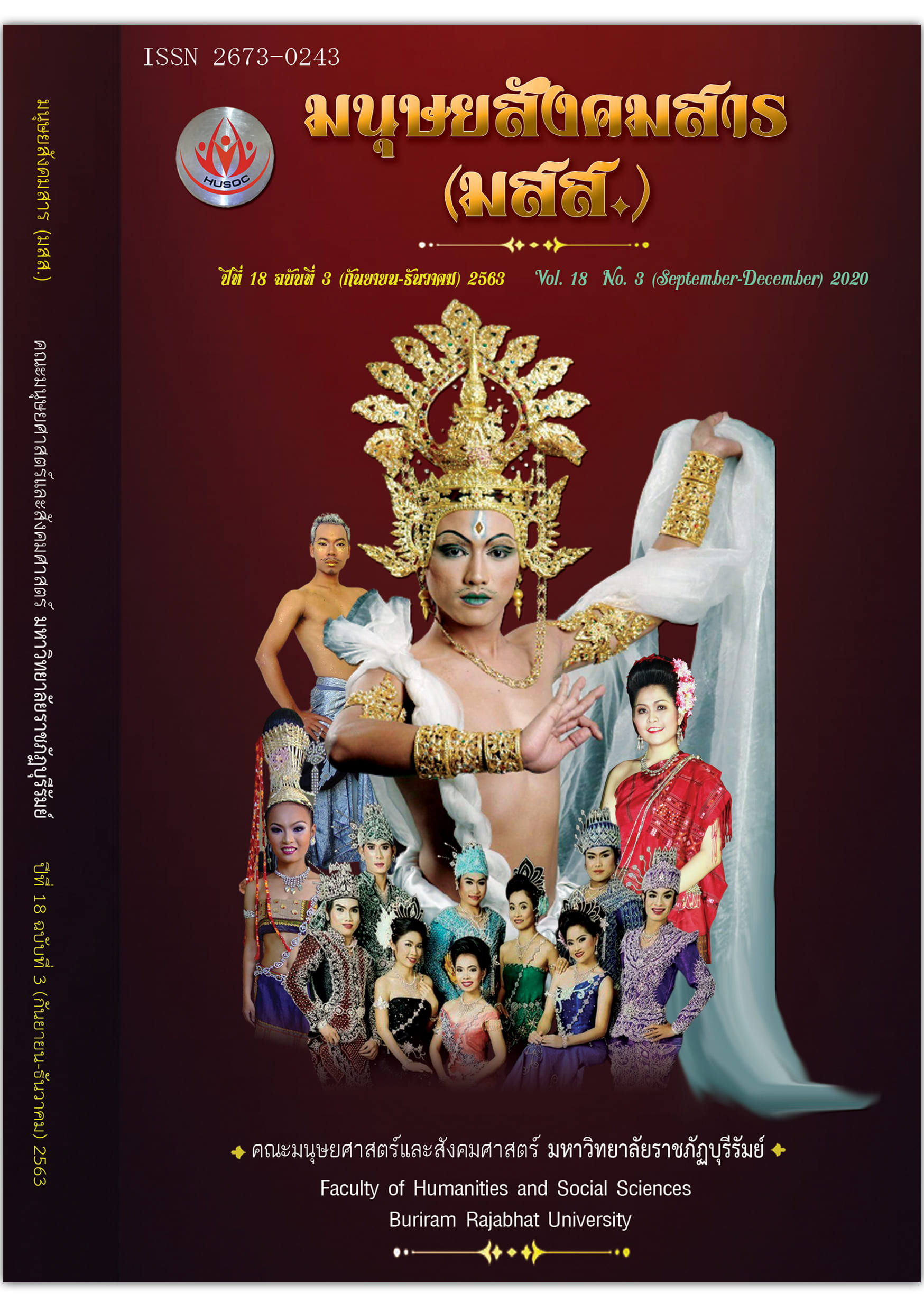การพัฒนาแบบทดสอบคู่ขนานสำหรับวัดความสามารถทั่วไป ด้านภาษาไทยของนักศึกษาครูในมหาวิทยาลัยของรัฐ
Main Article Content
บทคัดย่อ
การวิจัยครั้งนี้มีวัตถุประสงค์เพื่อพัฒนาแบบทดสอบคู่ขนานจำนวน 3 ฉบับ และสร้างเกณฑ์ปกติสำหรับแปลความหมายคะแนนจากแบบทดสอบวัดความสามารถทั่วไปด้านภาษาไทย ของนักศึกษาครูในมหาวิทยาลัยของรัฐ กลุ่มตัวอย่างที่ใช้ในการศึกษาครั้งนี้เป็นนักศึกษาครู ชั้นปีที่ 4 ปีการศึกษา 2561 ในมหาวิทยาลัยของรัฐ จำนวน 1,110 คน ซึ่งได้มาโดยการสุ่มแบบหลายขั้นตอน ผลการวิจัยพบว่าแบบทดสอบคู่ขนานทั้ง 3 ฉบับ ๆ มีข้อสอบฉบับละ 20 ข้อ ข้อสอบทุกข้อมีคุณภาพด้านความตรงเชิงเนื้อหา โดยทุกข้อมีค่า IOC เท่ากับ 1.00 ข้อสอบในแบบทดสอบฉบับที่ 1 , 2 และ 3 มีค่าความยากง่ายเฉลี่ยเท่ากับ 0.68 , 0.67 และ 0.67 มีค่าอำนาจจำแนกเฉลี่ยเท่ากับ 0.64 , 0.65 และ 0.64 และค่าความเชื่อมั่นของแบบทดสอบเท่ากับ 0.88 , 0.89 และ 0.88 ตามลำดับ ค่าสัมประสิทธิ์สหสัมพันธ์ของคะแนนจากแบบทดสอบฉบับที่ 1 กับ 2 ฉบับที่ 1 กับ 3 และฉบับที่ 2 กับ 3 เท่ากับ 0.88 , 0.89 และ 0.88 ตามลำดับ แสดงว่าแบบทดสอบทั้ง 3 ฉบับเป็นแบบทดสอบที่ขนานกัน เกณฑ์ปกติในรูปคะแนนทีปกติมีค่าตั้งแต่ 26 ถึง 69
Article Details
เนื้อหาและข้อมูลในบทความที่ลงตีพิมพ์ในวารสารทดสอบระบบ ThaiJo2 ถือเป็นข้อคิดเห็นและความรับผิดชอบของผู้เขียนบทความโดยตรงซึ่งกองบรรณาธิการวารสาร ไม่จำเป็นต้องเห็นด้วย หรือร่วมรับผิดชอบใดๆ
บทความ ข้อมูล เนื้อหา รูปภาพ ฯลฯ ที่ได้รับการตีพิมพ์ในวารสารทดสอบระบบ ThaiJo2 ถือเป็นลิขสิทธิ์ของวารสารทดสอบระบบ ThaiJo2 หากบุคคลหรือหน่วยงานใดต้องการนำทั้งหมดหรือส่วนหนึ่งส่วนใดไปเผยแพร่ต่อหรือเพื่อกระทำการใดๆ จะต้องได้รับอนุญาตเป็นลายลักอักษรจากวารสารทดสอบระบบ ThaiJo2 ก่อนเท่านั้น
เอกสารอ้างอิง
Al Aufi, M. A. (2014). Implications of the improvement of teaching quality for professional development (PD) of academics at the colleges of applied sciences (CASs) in the sultanate of Oman. Doctor of Philosophy (PhD). The University of Waikato NewZealand.
Allen, M. J. & Yen, W. M. (1979). Introduction to measurement theory. Monterey, CA: Brooks/ Cole.
Anastasi, A. (1968). Psychological testing (3rd ed.). London: Macmillan.
Ferguson, G. A. (1966). Statistical analysis in psychology and education (3rd ed.). New York: McGraw-Hill.
Frankel, J. R. & Wallen, N. E. (1999). How to design and evaluate research in education (4thed.). Boston, MA: McGraw Hill.
Gourneau, B. (2005). “Five attitudes of effective teachers: Implications for training”. Essays in Education, 13, p. 1-8.
Gronlund, N. E. (1981). Measurement and evaluation in teaching. New York: Macmillan.
Hambleton, R. K. & Swaminathan, H. (1985). Item response theory: Principles and applications. Boston: Kluwer Academic.
Kanjanawat, S. (2013). Classical test theory (7th ed). Bangkok: Faculty of Education, Chulalongkorn University. [in Thai]
Kermel, Louis J. & Marylin O. Kermel. (1978). Measurement and evaluation in the school. New York: McMillman Publishing.
Liukkonen, J. & Esko, L. (1999, August). The reliability and validity of scores from the children’s version of the perception of success questionnaire. Education and Psychological Measurement, 59(4), 651-664.
Lord, F. M. & Novick, M. R. (1968). Statistical theories of mental test scores. California: Harcourt Brace Jovanovich.
Laothong, N. (2016). Developing educational research tools measurement. Bangkok: Chulalongkorn University Press. [in Thai]
Macmillan, T. T. (1971, May). The Delphi technique. In Paper presented at the meeting of the California Junior Colleges Associations Committee on Research and development. n.p.
Mehren, W. A. & Lehmann, I. J. (1984). Measurement and evaluation in education and psychology. New York: Rinehart and Winston.
Pongboriboon, Y. (1979). Principles of evaluation and evaluation of education. Khon Kaen: Faculty of Education, Khon Kaen University. [in Thai]
Prayurnprohm, P. (2008). The development of Thai teacher professional aptitude test. Bangkok: Chulalongkorn University. [in Thai]
Panich, V. (2012). Skills in the new future: Education for the 21st century. Bangkok: Tathata publication. [in Thai]
________. Way of learning for students in the 21st century. Bangkok: Sodsri-Saritwongse Foundation. [in Thai]
Ryan, L. V. & Riordan, C. M. (2000). The development of a measure of desired moral approbation. Educational and Psychological Measurement, 60(3), 448-462.
Saiyos, L. & Saiyos, A. (2010). Educational research technique (11th ed.). Bangkok: Suwiriyasarn. [in Thai]
________. Techniques for measuring learning (2nd ed.). Bangkok: Children's Club. [in Thai]
Taweerat, T. (2000). Creation and development of achievement test (7th ed.). Bangkok: Educational and Psychological Test Bureau Srinakharinwirot University. [in Thai]
Tirakanan, S. (2010). Research methods in social science: A guide to practice. Bangkok: Chulalongkorn University Press. [in Thai]


